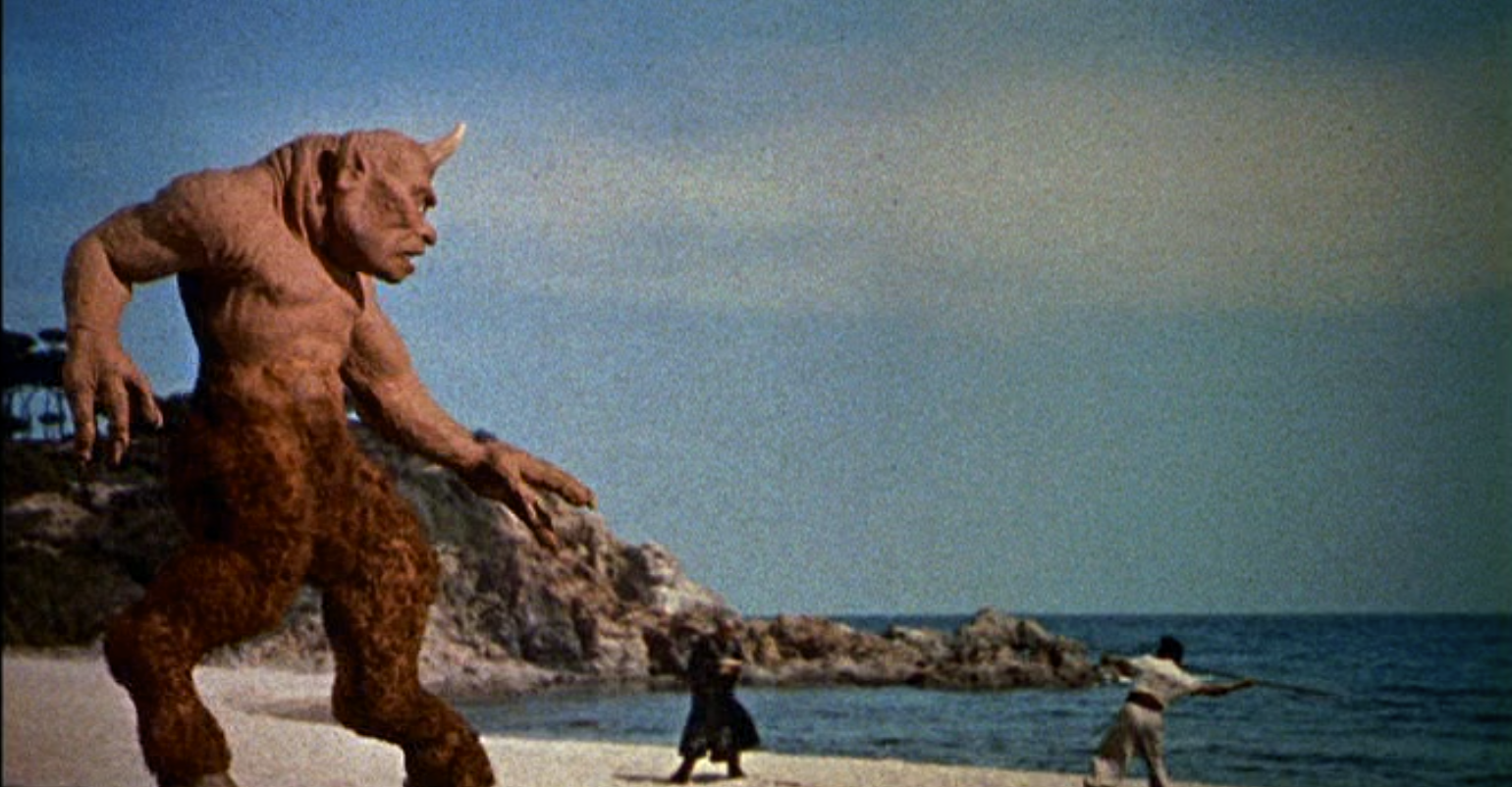Movie Review: The 7th Voyage of Sinbad (1958) directed by Nathan H. Juran
In a time when Baghdad was the city of cities, when the world was full of wonders, the adventurous merchant and ship captain Sinbad (Kerwin Mathews) has captured the heart of Princess Parisa (Kathryn Grant) of Chandra. On the voyage home to Baghdad to get married, which will seal a peace bargain between the Caliph (Alec Mango) and Parisa’s father the Sultan (Harold Kasket), Sindbad’s ship is blown far off course. They find land where none should be, the island of Colossa.

While restocking food and water, the crew sees a man running from a cyclops. This proves to be the magician Sokurah (Torin Thatcher). He’s stolen a lamp containing a child genie (Richard Eyer) from the one-eyed giants. Cut off from his underground castle, Sokurah orders the genie to create a barrier to protect himself and Sinbad’s crew from the cyclops, which the magical spirit does, but it doesn’t prevent the giant from throwing rocks at the escape boat, and the lamp is lost back to the cyclops.
Sinbad completes his voyage to Baghdad, much to the disgruntlement of Sokurah, who wanted to go right back for the lamp. The magician is further disgruntled when the Caliph refuses to fund an expedition to Colossa despite the promise of great treasure, due to the extreme danger. Sokurah’s design for a giant crossbow is derided. Even a demonstration of the magician’s powers at a feast for the Sultan fails to convince. Angered, Sokurah prophesizes that disaster will befall the two kingdoms, disaster only he can avert. It’s easily spotted as a fake prediction, and Sokurah is banished.
Before his deadline Sokurah “secretly” shrinks Princess Parisa to mouse size. (I say “secretly” as no one saw him do it, but it’s obvious he’s the culprit.) Since the only antidote for the shrinking spell is on the island of Colossa, Sinbad is forced to agree to sail back there with Sokurah. Most of his normal crew refuse to go because of the danger, so the ship captain fills out his crew with death row prisoners–who are about as loyal as you’d expect.
There are many dangers on Colossa, both monsters and humans. Will Sinbad be able to save the princess and return alive?
This classic film is best known for the stop-motion monsters created by Ray Harryhausen, which are awesome. The other special effects are also innovative for the 1950s and have aged well. My inner twelve-year-old loved every bit of the spectacle and the lush colors.
The acting…well, no one goes to this kind of movie for the acting. Sokurah at least gets to ham it up as he’s as much a performer as an actual magician. His powers are limited, and sometimes the questions they raise are actually answered. No direct attack spells, for example, and the potion he brewed to kill the cyclops requires the cyclops to be stupid enough to actually drink it. He also doesn’t actually have the power of prophecy, but can make accurate predictions based on things he knows that you don’t. For example, he says that the reddish water of a spring is poisonous and anyone who imbibes the liquid will surely die. It’s actually wine, and the crew members who drink it die due to being really drunk when they fight the cyclops.
The child genie is also very limited, being unable to cause harm, and doing the minimum to fulfill commands, not wishes. He’s pretty much there for kid appeal, and to be the one thing that Sokurah is willing to sacrifice everyone else for.
Princess Parisa may be in peril for most of the movie, but her shrunken state allows her to be useful more than once, and it’s easy to see why Sinbad loves her and vice-versa.
Due to Hollywood casting standards when the movie was made, none of the leads are actually Arabian, but some of the Spanish extras might have Moorish ancestry.
Content notes: Swashbuckling violence with many deaths. Animal (monster) abuse and death. A person is blinded. Alcohol abuse.
Overall: I love this movie. Make some popcorn, make room on the couch and watch it with your family.

